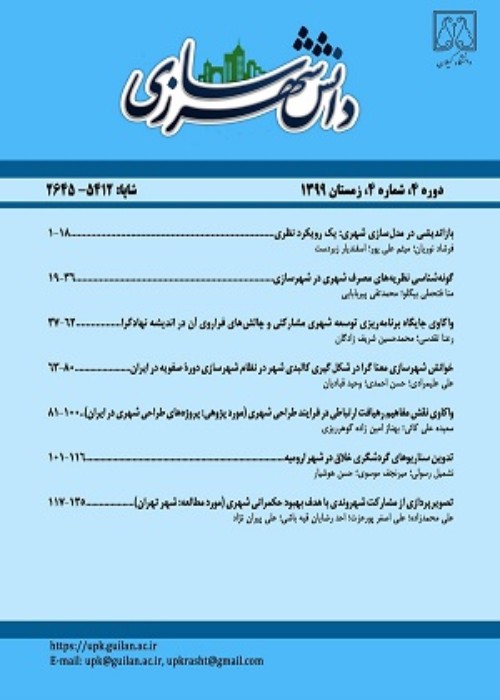Investigating the Status of Participatory Urban Development Planning and its Challenges in the Institutionalist School of Thought
In the context of public policy and planning of recent decades, public participation has been regarded as an absolute goodness or a common belief practice (common critical practice) which is rarely questioned. However, there is little evidence showed the long-term effectiveness of applicability the participatory approaches to improve the physical conditions of the most vulnerable groups or their success in creating social change. Meanwhile, as the related issues of participation concept are highly affected by neo-institutionalism theories, and the participatory processes are formed and regulated by institutional regulations, identifying the barriers and challenges of the participatory planning in different institutional levels and the affected institutional rules of these barriers is necessary to get out of them.
Investigating the failure reasons of the participatory approaches to access their primary goals as a problem in the collective action through detecting the causes and the factors of non-cooperative behaviors in the participatory processes leading to failure, and recommending an institutional framework for the participatory processes to overcome this problem.
The present study with an explanatory-exploratory approach in the framework of interrogative research strategy, uses various techniques e.g. systematic content analysis and qualitative deductive text analysis to answer the research questions.
After identifying the main institutional challenges of participation in the theoretical domain, emphasizing the content critiques on the application of participatory approaches, the Institutional Analysis and Development (IAD) framework introduced by Elinor Ostrom is used in this study to identify the seven-fold institutional rules governing participatory processes in the field of urban development planning, and finally, the conceptual model of the "Institutional Analysis Framework for Participatory Urban Development" is elaborated.
The analysis framework introduced in this study would be applicable in future applied research, in three levels namely: operational level, for generating practical outcomes of participatory planning, policymaking level for decision-making and policy making within the constraints and rules of collective choice affecting the structure of participatory planning action situations, and expandable and operational at the legal level for determining the participants for policy making and its determining rules.
- حق عضویت دریافتی صرف حمایت از نشریات عضو و نگهداری، تکمیل و توسعه مگیران میشود.
- پرداخت حق اشتراک و دانلود مقالات اجازه بازنشر آن در سایر رسانههای چاپی و دیجیتال را به کاربر نمیدهد.


